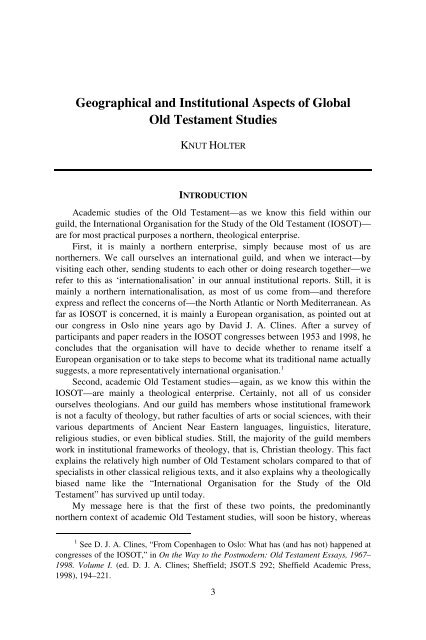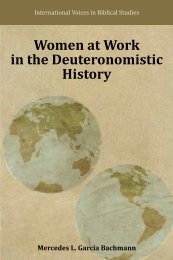Global Hermeneutics? - International Voices in Biblical Studies ...
Global Hermeneutics? - International Voices in Biblical Studies ...
Global Hermeneutics? - International Voices in Biblical Studies ...
Create successful ePaper yourself
Turn your PDF publications into a flip-book with our unique Google optimized e-Paper software.
Geographical and Institutional Aspects of <strong>Global</strong><br />
Old Testament <strong>Studies</strong><br />
KNUT HOLTER<br />
INTRODUCTION<br />
Academic studies of the Old Testament—as we know this field with<strong>in</strong> our<br />
guild, the <strong>International</strong> Organisation for the Study of the Old Testament (IOSOT)—<br />
are for most practical purposes a northern, theological enterprise.<br />
First, it is ma<strong>in</strong>ly a northern enterprise, simply because most of us are<br />
northerners. We call ourselves an <strong>in</strong>ternational guild, and when we <strong>in</strong>teract—by<br />
visit<strong>in</strong>g each other, send<strong>in</strong>g students to each other or do<strong>in</strong>g research together—we<br />
refer to this as ‘<strong>in</strong>ternationalisation’ <strong>in</strong> our annual <strong>in</strong>stitutional reports. Still, it is<br />
ma<strong>in</strong>ly a northern <strong>in</strong>ternationalisation, as most of us come from—and therefore<br />
express and reflect the concerns of—the North Atlantic or North Mediterranean. As<br />
far as IOSOT is concerned, it is ma<strong>in</strong>ly a European organisation, as po<strong>in</strong>ted out at<br />
our congress <strong>in</strong> Oslo n<strong>in</strong>e years ago by David J. A. Cl<strong>in</strong>es. After a survey of<br />
participants and paper readers <strong>in</strong> the IOSOT congresses between 1953 and 1998, he<br />
concludes that the organisation will have to decide whether to rename itself a<br />
European organisation or to take steps to become what its traditional name actually<br />
suggests, a more representatively <strong>in</strong>ternational organisation. 1<br />
Second, academic Old Testament studies—aga<strong>in</strong>, as we know this with<strong>in</strong> the<br />
IOSOT—are ma<strong>in</strong>ly a theological enterprise. Certa<strong>in</strong>ly, not all of us consider<br />
ourselves theologians. And our guild has members whose <strong>in</strong>stitutional framework<br />
is not a faculty of theology, but rather faculties of arts or social sciences, with their<br />
various departments of Ancient Near Eastern languages, l<strong>in</strong>guistics, literature,<br />
religious studies, or even biblical studies. Still, the majority of the guild members<br />
work <strong>in</strong> <strong>in</strong>stitutional frameworks of theology, that is, Christian theology. This fact<br />
expla<strong>in</strong>s the relatively high number of Old Testament scholars compared to that of<br />
specialists <strong>in</strong> other classical religious texts, and it also expla<strong>in</strong>s why a theologically<br />
biased name like the “<strong>International</strong> Organisation for the Study of the Old<br />
Testament” has survived up until today.<br />
My message here is that the first of these two po<strong>in</strong>ts, the predom<strong>in</strong>antly<br />
northern context of academic Old Testament studies, will soon be history, whereas<br />
1 See D. J. A. Cl<strong>in</strong>es, “From Copenhagen to Oslo: What has (and has not) happened at<br />
congresses of the IOSOT,” <strong>in</strong> On the Way to the Postmodern: Old Testament Essays, 1967–<br />
1998. Volume I. (ed. D. J. A. Cl<strong>in</strong>es; Sheffield; JSOT.S 292; Sheffield Academic Press,<br />
1998), 194–221.<br />
3




